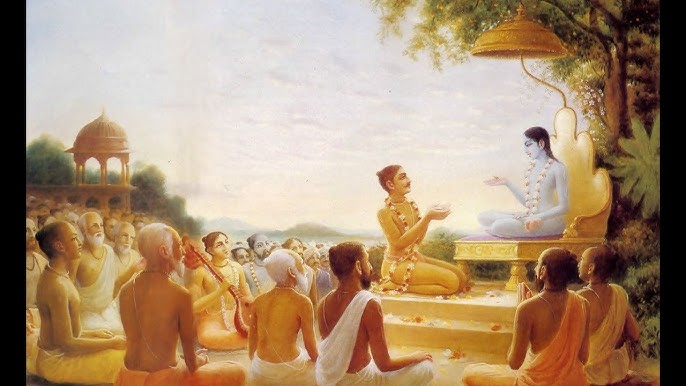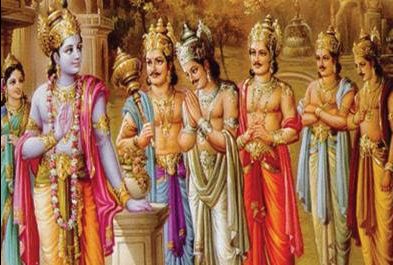The nineteenth chapter of the Śrīmad-Bhāgavatam is titled “The Appearance of Śukadeva Gosvāmī.” This chapter marks a pivotal moment in the Bhāgavatam’s narration as the sage Śukadeva Gosvāmī arrives to enlighten Mahārāja Parīkṣit and guide him toward spiritual liberation. It captures the beginning of the most exalted discourse on the Bhāgavatam, embodying the theme of divine wisdom, surrender, and spiritual urgency.
Mahārāja Parīkṣit’s Renunciation: A Divine Turning Point
As the chapter opens, Mahārāja Parīkṣit continues to prepare himself for impending death, following the curse of Śṛṅgi. With a spirit of detachment and surrender, he takes refuge by the sacred river Ganges, abandoning his royal comforts and duties. His only desire is to engage in hearing the pastimes of the Lord from an authoritative source.
Parīkṣit’s renunciation is driven by an awareness that death is inevitable and can come at any moment. The imminent deadline of seven days compels him to focus solely on the spiritual essence of life. The king’s actions set a profound example of how a true devotee embraces challenges as opportunities to deepen spiritual realization.
Lesson:
Mahārāja Parīkṣit teaches us the importance of urgent spiritual preparation. His decision to relinquish all material attachments in the face of death serves as a call for all spiritual seekers to focus on the eternal self. Life’s unpredictability is a reminder that we should cultivate a sense of urgency to develop our Krishna consciousness, rather than postponing it for the future.
The Assembly of Sages: A Convergence of Divine Seekers
As Parīkṣit takes his seat at the bank of the Ganges, sages from various parts of the world—each possessing profound spiritual knowledge—gather to witness the king’s final days. These sages include Vyāsadeva, Nārada Muni, Atri, Vasiṣṭha, Parāśara, Viśvāmitra, Bharadvāja, Gautama, and many more. Their presence signifies the importance of sādhusangha (association with saintly persons) in spiritual advancement.
The presence of these revered sages at this critical moment emphasizes that true spiritual knowledge cannot be obtained in isolation. It thrives in the association of the wise, where spiritual energy is amplified, and guidance is readily available. This grand assembly of spiritually enlightened souls represents a rare and auspicious moment, symbolizing the highest form of devotee association.
Lesson:
The assembly of sages at Parīkṣit’s final moments underscores the need for holy association in our spiritual journey. Surrounding ourselves with devotees and wise souls can provide the necessary inspiration, clarity, and strength to face life’s challenges. It is through such association that spiritual knowledge becomes more accessible and our determination to serve Krishna becomes stronger.
Arrival of Śukadeva Gosvāmī: The Divine Messenger
At this sacred juncture, Śukadeva Gosvāmī arrives at the scene. He is described as a young and naked renunciant, radiating a transcendental aura that immediately captivates everyone present. Despite his youthful appearance, Śukadeva is revered by the assembly as the supreme teacher of the Bhāgavatam, a testimony to his spiritual stature.
Śukadeva’s arrival is not ordinary; it is divinely orchestrated by Krishna to guide Parīkṣit in his final moments. This moment demonstrates how the Lord arranges for the spiritual upliftment of sincere seekers, even under the most pressing circumstances. Śukadeva Gosvāmī’s decision to enlighten Parīkṣit reflects his compassion for all living entities and his desire to share the nectar of the Bhāgavatam.
Lesson:
Śukadeva Gosvāmī’s appearance exemplifies how the Lord sends His pure devotees to guide sincere seekers. In our spiritual journey, we should seek out bona fide spiritual teachers who embody Krishna’s teachings, as they can provide the necessary guidance and inspiration to progress toward spiritual liberation.
Śukadeva’s Unwavering Renunciation: The Pinnacle of Detachment
Śukadeva Gosvāmī, the son of Vyāsadeva, is renowned for his unwavering detachment from the material world. He was born liberated, having never experienced material desires or attachments. Despite his divine birth, Śukadeva chose the life of a wandering mendicant, living without any worldly possessions.
Śukadeva’s detachment is not forced or artificial but a natural consequence of his realization of the Lord’s all-attractive nature. His ability to reject all material allurements while remaining completely absorbed in Krishna’s service represents the highest standard of vairāgya (renunciation).
Lesson:
Śukadeva Gosvāmī’s life demonstrates that true renunciation is not simply the absence of material possessions but the complete absence of material desires. It is not about what we give up, but rather about what we embrace—pure devotion to Krishna. We should aspire for a similar spirit of detachment, not out of frustration, but out of a genuine attraction to Krishna’s transcendental pastimes.
Parīkṣit’s Questions: A Seeker’s Quest for Truth
When Śukadeva arrives, Parīkṣit humbly offers his respects and expresses his eagerness to hear about Krishna. Despite being a king, Parīkṣit approaches Śukadeva as a disciple, eager to receive spiritual wisdom. His inquiries are sincere, reflecting his urgency to know the essence of dharma and the ultimate purpose of life.
The king asks questions that are relevant not only to himself but to all humanity:
- What should a man hear, chant, and remember at the time of death?
- What should one do to achieve the highest perfection of life?
These questions are at the heart of the Bhāgavatam’s teachings, setting the tone for Śukadeva’s discourse. Parīkṣit’s humility, sincerity, and eagerness to hear about Krishna reveal the ideal mood of a disciple.
Lesson:
Parīkṣit’s questions remind us of the importance of asking meaningful spiritual questions that direct our minds toward the Supreme Truth. Our spiritual progress depends on our inquiry—the more sincere and genuine our desire for spiritual knowledge, the more readily Krishna arranges for our enlightenment.
The Role of Śravaṇa (Hearing): The Path to Liberation
As Parīkṣit prepares to hear from Śukadeva, the chapter emphasizes the significance of śravaṇa (hearing) as the primary means of spiritual elevation. Śravaṇa, or hearing about Krishna’s pastimes and glories, is described as the most potent process for purifying the heart and achieving liberation.
Śukadeva Gosvāmī, through the recitation of the Bhāgavatam, sets the stage for one of the most profound spiritual discourses ever recorded. The very act of hearing the Bhāgavatam is considered a sacred and transformative process, capable of cleansing the deep-seated material desires and awakening pure love for God.
Lesson:
The emphasis on hearing in this chapter teaches us that the first step to spiritual awakening is the receptive process of hearing. Just as Parīkṣit prepared himself by attentively hearing the Bhāgavatam, we too should prioritize hearing from bona fide sources. By consistently engaging in śravaṇa, we can cleanse our hearts and align ourselves with the path of pure devotion.
The Importance of Time: Urgency in Spiritual Life
Parīkṣit’s seven-day deadline for death serves as a powerful reminder of the urgency of spiritual practice. His situation, though extreme, symbolizes the transient nature of life and the reality that death can come at any moment. Parīkṣit’s commitment to dedicating every moment to hearing the Bhāgavatam emphasizes that time is the most valuable resource in spiritual life.
Śukadeva Gosvāmī’s arrival in response to Parīkṣit’s sincere call illustrates that when we approach Krishna with genuine eagerness, He reciprocates by providing the necessary guidance. It also highlights that the Lord’s mercy is not bound by time—those who sincerely seek Him, regardless of the time remaining, can attain spiritual success.
Lesson:
The urgency of Parīkṣit’s spiritual quest is a wake-up call for us to value every moment in spiritual practice. We must use our time wisely, dedicating it to hearing, chanting, and serving Krishna. Life is short, and every moment spent in Krishna consciousness brings us closer to the ultimate goal.
The Ideal Teacher and Student Relationship
The relationship between Śukadeva Gosvāmī and Mahārāja Parīkṣit serves as a model of the guru-disciple relationship. Śukadeva’s willingness to share the Bhāgavatam’s teachings with Parīkṣit, despite knowing that the king has only seven days to live, exemplifies the compassion of a true spiritual master. Meanwhile, Parīkṣit’s humility and eagerness to hear demonstrate the qualities of an ideal disciple.
Śukadeva’s ability to teach the Bhāgavatam with such depth and clarity reveals that the divine knowledge of the scriptures can only be effectively communicated through qualified teachers who embody the teachings themselves.
Lesson:
The relationship between Śukadeva and Parīkṣit emphasizes the importance of approaching a genuine spiritual teacher with humility, faith, and eagerness to learn. It reminds us that spiritual knowledge is not a mere academic pursuit but a transformative process that requires the blessings and guidance of a qualified guru.
Call to Action: Embrace the Bhāgavatam’s Teachings
As we delve into Chapter 19 of the Śrīmad-Bhāgavatam, we are called to embody the spirit of Mahārāja Parīkṣit—to approach spiritual life with urgency, sincerity, and humility. We are reminded that life’s challenges are opportunities for spiritual growth and that even the most adverse situations can be transformed into avenues for Krishna consciousness.
By consistently engaging in the process of hearing the Bhāgavatam, we can cleanse our hearts, develop detachment from the material world, and awaken our innate love for Krishna. Let this chapter inspire us to make spiritual hearing a daily priority and to approach the Bhāgavatam as our guide to life’s greatest journey—the journey back to Krishna’s lotus feet.
Conclusion: The Beginning of Bhāgavatam’s Glorious Journey
The nineteenth chapter marks the beginning of a divine dialogue between Śukadeva Gosvāmī and Mahārāja Parīkṣit, a dialogue that carries the essence of bhakti, the path of devotional service. It sets the stage for a profound exploration of Krishna’s pastimes, spiritual knowledge, and the highest truths of existence. As we continue to study the Bhāgavatam, let us embrace its teachings with a heart full of faith, eagerness, and surrender, just as Mahārāja Parīkṣit did.





